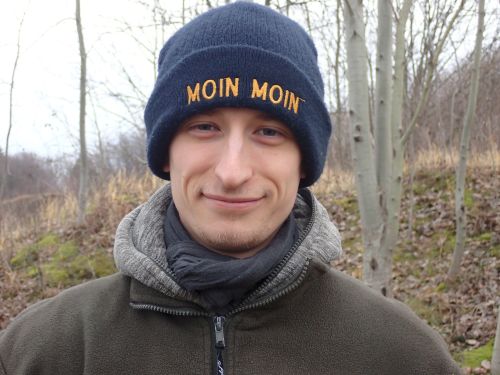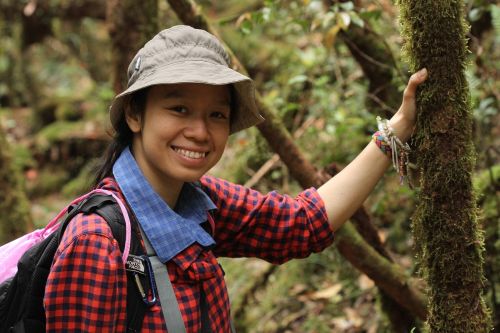
Enrique Hernández Rodríguez (Institut de recherche sur les forêts, Université du Québec en Abitibi-Témiscamingue, Canada)
Hello! I am Enrique, and I am interested in understanding how human activities can affect bryophyte diversity in boreal and tropical ecosystems. After my studies at the Universidad de la Sierra Juárez (BSc) and the Universidad Michoacana de San Nicolás de Hidalgo (MSc) in Mexico, I started my Ph.D. at the Université du Québec en Abitibi-Témiscamingue, Canada under the direction of Nicole J. Fenton. My current research project consists in evaluating the effect of landscape composition and configuration on bryophyte diversity, understanding the common and rare bryophyte patterns at a regional scale, and figuring out landscape features have impacts on the genetic diversity of a moss species. All this research is developed in the magnificent boreal forest in Western Quebec, Canada. I appreciate being one of the ten international students selected to participate in the
Bryology Summer School. This opportunity will help me increase my knowledge of bryophyte identification and learn more about its ecosystemic functions and human uses in Europe. Also, being part of this experience will give me the chance to increase my network and, why not, to know new bryo-friends!

Geoffrey Zanin (University of Québec in Abitibi-Témiscamingue, Canada)
Hi, I’m a French PhD student at the University of Quebec in Abitibi témiscamingue, a Canadian university located in a remote region of the province of Quebec, in the heart of the boreal forest. By going to Latvia for the bryology summer, I hope to enrich my knowledge of bryophytes, discover other approaches to studying these small organisms and meet new people.

Tim Heidelk (Technische Universität Dresden, Germany)
For me, bryophytes are an incredibly fascinating group of species. Even though I have been studying bryophytes for some time, there is still so much new to discover. Since I am active in a region with strongly anthropogenically changed moss and lichen flora, I hope to gain insight into an area with intact flora by participating in the Summer School. Besides, I really look forward to meet people with the same interests.

Daniel Skowron (Institute of Forest Sciences at Bialystok University of Technology, Poland)
My scientific interests are geobotany and forest ecology. I am especially fascinated by the world of bryophytes. I live and work in the Bialowieza Forest, where I enjoy rare epiphytic and epixylic forest species, but I hope to have another meeting with boreal extraordinary peatland species in the lands of beautiful Latvia. It will also be a great opportunity to meet more positively plant-minded people 🙂

Miriam Diez (University of Hohenheim, Germany)
“The world of mosses is so small and yet so beautiful. Between all the big plants you have to look closely to discover the small miracles. I am very excited about the support of the Summer School to further deepen the knowledge I have built up so far”.

Julie Indráková (Masaryk University, Czech Republic)
I believe this Bryology Summer School would be a great way to expand my knowledge of bryophytes, improve my determination skills, and amazing opportunity to see Latvian’s beautiful peat biotopes, which can be rarely seen in our country.

Mariusz Wierzgoǹ (University of Silesia in Katowice, Poland)
Due to their variability, the bryophytes cause a lot of problems for young botanists and generally are difficult to identify. There is no better way to learn than active field work, especially under the supervision of more experienced bryologists. The opportunity to enhance practical knowledge of identifying bryophytes, especially those which are rare in my home country, is my main motivation to participate in the course. I hope that participation in the BSS 2023 will also enable the exchange of experiences related to species protection and environmental management from the other countries’ perspective. It will be an opportunity to meet new people, as well as to establish scientific cooperation, which in the future may result in joint projects. It is also a great chance to spend time in the beautiful Latvian natural landscape and learn more about the culture of the host country.

Isaac Tiselius (Stockholms universitet,Sweden)
It is rare for me to have enthusiastic company when being outside looking at bryophytes. During this summer school, I am looking forward to enjoying the company of other bryologically inclined people! Hopefully, I will also go from being able to identify a handful of species to two handfuls at least!

Christian Anich (University of Innsbruck / Tyrolean State Museums, Austria)
Bryophytes are an often neglected group of organisms, especially in my region. I developed my interest in bryophytes a couple of years ago and it is my intention to map bryophytes in Tyrol and communicate and teach about them. I hope that after taking part in this summer-school I will be more confident in my field-identification skills and know more about functions of bryophytes in the ecosystem and as part of our human environment. Getting to know like-minded people and exchanging experience and knowledge now and hopefully in the future will surely also help all of us participants to get further in our understanding and studies of nature and the role of us humans in it. And, as we can only protect what we know, to gain and spread knowledge is very important for environmental conservation efforts.

Thien-Tam Luong (University of Turku, Finland)
I am currently working on my doctoral thesis on the taxonomy and phylogeny of Meteoriaceae, a tropical moss family. One of my career goals is to complete the Bryophytes flora of Vietnam, therefore obtaining more knowledge about bryophyte, both taxonomical and ecological will be very useful for me to design research projects in the future.